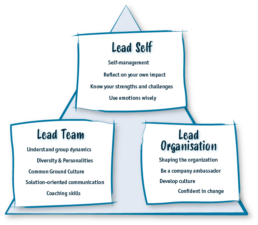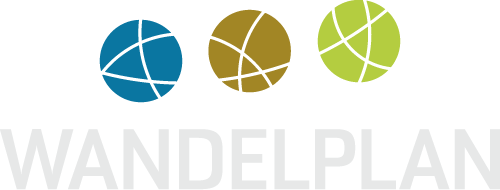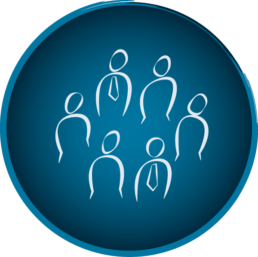Our understanding of coaching
How we coach
Appreciating what has gone before
Before a person is even willing to change, it is important to appreciate past behavior. In doing so, we are in the mindset that the person has done their best so far – regardless of whether that was always ideal. If this appreciation is missing, the entire past behavior is questioned. With appreciation, the motivation for change is much higher.
Solution-oriented
In coaching, we focus mainly on the solutions, less on the problems and causes. In the spirit of Albert Einstein, “You can never solve problems with the same way of thinking that created them.” The coachee develops his or her own ideas for solutions, with which ingrained patterns can be interrupted and new actions can be tried out. This is often practiced already in the session with the coach.
Sustainable
Between the individual coaching sessions, there are “transfer tasks” to ensure sustainability. At the end of each coaching session, the coach and coachee agree on what the coachee will specifically try out in his or her daily work. The coachee also gives the coach feedback in between, e.g., on a planned team meeting, what should be improved, or a conflict meeting that has taken place.
Systemic
To understand the coaching issue and the coachee, we also look at the person in the context of the team and the organization with its culture, processes, and structures. The mechanisms of action always play a role as well. In this way, we can precisely delineate which levers lie in the person of the coachee and which in the organization.
100% Practical
Upcoming discussions or information to the team are practically rehearsed during the coaching – with video coaching and the “before and after” effect. This means that the manager carries out the project once, is recorded, receives feedback from the coach, implements the feedback directly in a second run, and then sees the difference. For privacy reasons, we record it with the coachee’s cell phone.
Confidential
The contents of the coaching conversations are strictly confidential. The coachee can self-report to his/her supervisor on the status or success of the coaching, deciding for what wants to be shared. If the HR department is involved, either the coachee can report on the status of the coaching process or the coach can provide information (number of sessions held, etc.), but not on the content as a matter of course.
Coaching for managers
Leadership is fun!

Reasons for executive coaching
- Appreciative communication: You are an expert, but in appreciating and communicating with employees you also receive critical feedback and are looking for support in implementing it?
- Role change: You are already a manager, but you are taking on a much larger team or more responsibility? Are you moving into top management or the board of directors? Are you looking for a sparring partner to make the first time as good as possible?
- Conflict management: There are conflicts within the team or between you and the team? Or between you and the work council, other colleagues, or role holders? And you would like to resolve the conflict constructively and improve cooperation again? Or clarify whether only separation is still possible?
- Self and emotion management: dealing with own emotions as a manager and with those of employees, e.g., in change processes
- Culture/organizational development, change management
- Strategic further development of an area, e.g,. towards more innovation
- Health management: development of a health-promoting culture, dealing with issues such as burnout, high levels, of sick leave, or mental illness, etc.
- Burn-Out Prevention/ Stress Management: You feel more and more overwhelmed or stressed and don't know how?
- Appearance and presence: You don't like to stand in front of large groups or want to appear more confident?
- Further development/career: Do you want to reflect with a sparring partner on how you can develop further in the organization or make a career?
- Dealing with leadership tasks: Topics as demarcation, closeness and distance, delegating, leading at eye level, virtual leading, etc., can be coached.
- Project coaching: Supporting the project management with regard to project management, communication, and "soft" factors in the project
- Intercultural challenges
- Virtual leadership, agile working
Framework
A coaching session can last 2 hours or half days, especially if the coachee travels further. Coaching packages are agreed upon, e.g., 8 meetings of 2 hours each (=16 hours). Alternatively, for example, four half days.
The coaching sessions are usually held at the coach’s premises or as online coaching. The coachee receives documentation of the coaching (photos of the flipcharts).
The coaching is finished when the goals are achieved. Thus, the estimated coaching volume does not have to be fully called up. The fee for a Professional Coach is usually €225/h plus VAT and for a Senior Coach €250/ h plus VAT. Cancellation or rescheduling of an agreed coaching session can be made free of charge up to 2 days before the appointment, depending on the framework agreement with the company. After that and in case of unexcused absence, the agreed fee will be due.
The coach is subject to confidentiality regarding the coaching content.
Inquiries
Coaching for employees
Strengthening valuable employees
Coaching is excellent to support employees beyond their professional competence, to discover their potentials, and to show possibilities for development. Dealing with one’s own issues in coaching often leads to better reflection skills, self-efficacy, and satisfaction of the employees*, which they can subsequently bring back to their company.
Reasons for employee coaching
- Role in the team: assumption of a new role or change of role in the team
- Performance/ Efficiency
- Conflicts
with the manager and/or with individual colleagues combined with the question: What can I do to solve the conflict? What part do I have in this? - Personal or private issues
that can have an impact on professional life: Illness, parents in need of care, private difficult issues, and crises.
- Appearance/ Presence
or communication with central, other departments - Stress or exhaustion:
What stresses me and what gives me energy? What can I do to get back into my power and be effective at work?
- Looking to the future:
What do I still want to achieve professionally? Where do I stand right now? How can I get more satisfaction back in my job?
Inquiries
Coaching for teams
Teamwork makes the dream work
Differences between team coaching and a team workshop
- Team coaching
usually describes a longer process, i.e. several sessions with the team take place at certain intervals. A team workshop is usually a one-time event, followed by a follow-up workshop if necessary. - Team coaching is suitable for 8 to max. 12 people, while a team workshop can also work with larger teams or multiple teams of up to 20-25 people.
- A Team workshop is suitable for a current or special challenge of a team and can also be the start of a team coaching process.
Reasons for team coaching
- Vision development
or value work with teams - Further development
of a team e.g., towards optimized communication, more innovation, more creativity, better collaboration, etc. - Optimization of the cooperation
with other teams / departments
- Conflictswithin the team or conflicts between team and manager
- New composition of teams
- Dealing with losses or mourning
in teams, e.g., after severe staff reductions, serious illness, or death of colleagues or other stressful, sudden events
Are you looking for coaching for managers, teams, or employees?
Then simply write us here in our contact form or by email your request and we will get back to you promptly. Or you can call us directly between 9 am and 3 pm at +49 (0)6023-9189494.
And further?
We schedule a phone appointment and ask questions for clarification of goals. The telephone call can be made to the supervisor, a team member, or the responsible HR manager.
We will then provide you with a non-binding offer including time frame, coach profiles, and costs for the coaching. We are also happy to advise you on whether coaching, a workshop, or a seminar would be most effective for your needs.
You are welcome to get to know the coach in advance to see if the “chemistry” is right – by phone, video call, or even in person.
You can view everything at your leisure and simply contact us if the offer suits you or if you have any questions.





